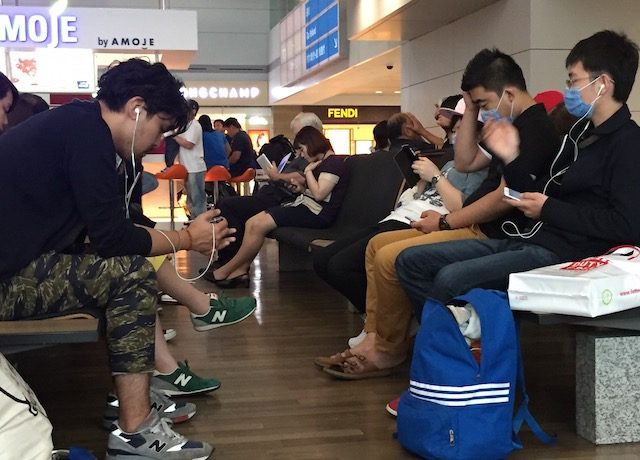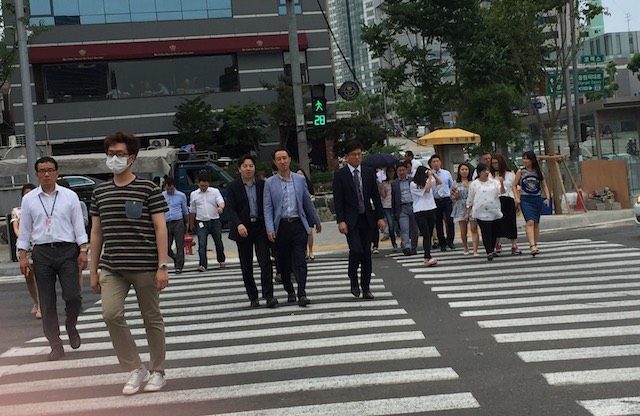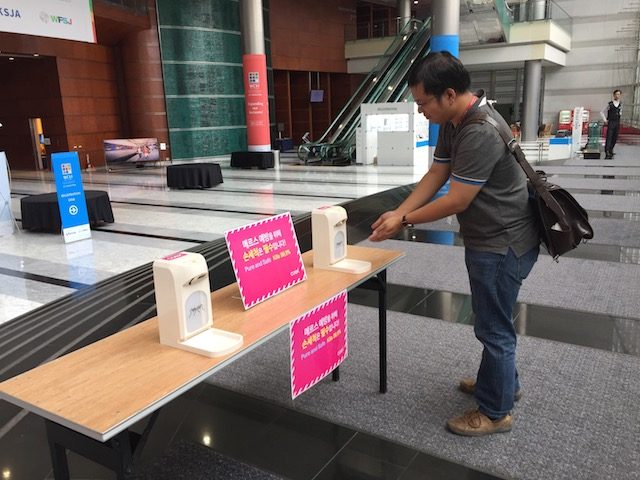SUMMARY
This is AI generated summarization, which may have errors. For context, always refer to the full article.

FUKUOKA, Japan – In a few hours, I will be heading back to Manila together with two other Filipino journalists who participated in the bi-annual World Conference of Science Journalists (WCSJ) in Seoul, South Korea. Second to the traffic mayhem in our major highways in Metro Manila, I fear that I will be put under quarantine once airport officers see me sneeze or hear me cough, especially when they’ve read my health declaration that I was, for a few days, in Seoul.
I have had cough and colds before I went to South Korea last week. Over-the-counter flu remedy lasts for a few hours, but then I’m back to sneezing and barking like a dog. I was trying my best to keep my infection to myself, making sure that I wear a face mask before I alight from the plane when it arrived at Incheon Airport. I also sneeze and coughed only when no one was looking or nearby.
In Korea, I didn’t want to draw attention to my… err.. viral infection for I might be mistaken as a carrier of MERS CoV (Middle East Respiratory Syndrome-Corona Virus). MERS is an illness affecting the respiratory system. Among the symptoms are fever, cough and shortness of breath, and could be spread through close contact with infected individuals. It was first reported in Saudi Arabia in 2012.
But I was quite surprised that not everyone in the airport was as paranoid as I was, not even on the bus I rode to the hotel, nor the streets I walked for the entire time I stayed in the Gangnam area in Seoul.
But my paranoia doesn’t end there.
Every mall entry has a hand sanitizer, and even coffee shops – and in Gangnam, there are A LOT of cafes – offer sanitizers for consumers as well. I thought that because I was already suffering from a viral infection which probably made me more susceptible to contracting MERS, I should double my effort and use hand sanitizers as often as I can, and wear a mask all the time.
Until I realized that I could actually keep cool about it while still maintaining extra care – personal hygiene is top priority. I had to check whether there are nearby hospitals as well, just to be sure that there will be a very small chance that I would catch the fatal infection.
The first MERS case in South Korea was detected in May 20, after the carrier went on a trip to Saudi Arabia. Within a few weeks, the virus spread fast, infecting 126 in the country, with 11 deaths as of June 12. More than 3,000 people remain in quarantine.

While I kept my stash of face masks inside my bag all the time, I walk from the hotel to the conference area every morning not wearing one. I was observing people, whether there was a stigma, or whether those who wear masks are discriminated. At least, within the area that I stayed at, everything seems to be okay. Kyunggi Highschool, located atop a hill around two blocks from the conference area (COEX), is open. Samsung Medical Center, which was where the first MERS case in South Korea was diagnosed was about 30 minutes away from my hotel via bus, so the chances that we could come in close contact with anyone with a virus were slim.
On Wednesday morning, two Korean doctors allayed fears on MERS, saying that the number of confirmed cases sharply declines, and people could go on normal activities. They also said that the virus is unlikely to be transmitted in community settings like in subways, restaurants, and malls. Other good news that they reported is that the virus strain extracted from the first diagnosed individual has not mutated from that which was first seen in Saudi Arabia.
While the Korean doctors admit that there might have been lapses in the way the government responded on the first few cases, they said that they are capable of containing the virus. They said that they are fully equipped in providing ample medical care for the infected individuals.
Meanwhile, when someone asked whether people should remove their masks, they said that people should be encouraged to wear face masks, at least to remove the stigma on people who might have symptoms.
I still didn’t wear my mask after that.
Being at the center of a controversial viral outbreak could be an exciting coverage for a science journalist. Having the WCSJ in a place where there is an outbreak is perfect timing to at least clarify the MERS scare prevailing on international media.

Personally, I find it ironic learning that some participants and speakers didn’t make it to Seoul because of the on-going travel ban from their countries. A journalist from Sierra Leone spent days in quarantine to be granted as visa to Korea because the authorities wanted to make sure he has no Ebola. When he goes back to his country, he will be put in quarantine as well, this time because of MERS.
When we headed to Incheon Airport the other day, not even all the airport employees and immigration officials wore face masks. It was a bit reassuring for people, that there was a semblance of normality, especially for those who are not really sure whether they should be wearing face masks or not.
For me, I was relieved that I finally left Korea that day.
At the Fukuoka Airport in Japan, there are temperature scanners. Thankfully, I didn’t have a fever when we arrived which could easily increase suspicion that I might be carrying the deadly MERS. I never had a fever during my stay in Korea anyway.
I’m pretty sure I’ll have to write down “cough” in the health declaration document when I arrive in Manila, adding that I came from South Korea two days ago. But if I don’t have a fever, at least I can get past the immigration and carry on normally, right? – Rappler.com
Add a comment
How does this make you feel?
There are no comments yet. Add your comment to start the conversation.